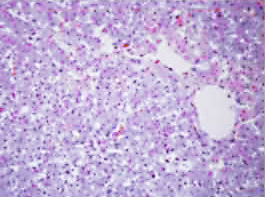-

Blood Test Could Provide Snapshot of Overall Health
Circulating protein levels may serve as a biomarker for cardiorespiratory fitness, an important but previously hard-to-measure component of overall health, according to a study published in Nature Medicine.
-

B Vitamins May Help Those with Artery Disease Walk Farther
Vitamin B3 supplements may help people with peripheral artery disease walk farther, according to a Northwestern Medicine-led clinical trial published in Nature Communications.
-

Medical Student Investigates Racial and Ethnic Disparities in Medicaid Disenrollment
Kranti Rumalla, a second-year medical student at Feinberg, was the lead author of a study that found racial disparities among patients who were disenrolled from Medicaid coverage after the end of the COVID-19 Public Health Emergency.
-

Protein May Hold Key to Transplant Tolerance
Northwestern Medicine investigators have uncovered how a single protein contributes to heart transplant tolerance in mice, according to a study published in the Proceedings of the National Academy of Sciences.
-

Combination Therapy May Improve Outcomes for Advanced Bladder Cancer
Patients with immunotherapy-resistant bladder cancer who received a novel combination treatment demonstrated improved response to treatment, according to a recent study published in Nature Medicine.
-

New Cellular Mechanisms in Parkinson’s Disease Discovered
A pair of recent studies led by Joseph Mazzulli, PhD, have uncovered previously unknown cellular mechanisms involved in neuronal protein aggregation and misfolding, key characteristics of Parkinson’s disease, which may serve as therapeutic targets.
-

Embryo’s Signaling Mechanism May Promote Healthy Aging, Combat Neurodegenerative Diseases
Northwestern investigators have identified a novel transcription factor which regulates a signaling mechanism utilized by a fertilized embryo to protect its mother from cellular and environmental stress, according to a recent study to published in the journal Genes and Development.
-

Center for Engineering in Vision and Ophthalmology Marks Launch with Symposium
Northwestern’s Center for Engineering in Vision and Ophthalmology recently celebrated its launch with a symposium focused on the work of next-generation engineers and physicians.
-

Improving Measurement of Gene Expression in Single Cells
Northwestern Medicine scientists have developed a new technique to identify individual cells for RNA sequencing, which will empower scientists to gather more accurate and precise scientific data, according to details published in Cell Genomics.
-

Understanding Inflammation in the Heart
Inflamed heart muscles can mount immune responses even in the absence of immune cells, according to a Northwestern Medicine study published in the Journal of Clinical Investigation.
-

Improving Advanced Care Planning for Late-Stage Cancer
Multilevel care interventions improved clinician–documented advanced care planning compared with a clinician-level intervention alone for patients with genitourinary cancer, according to recent findings published in JAMA Oncology.
-

Investigating DNA Flexibility for the Creation of New Biomaterials
Northwestern investigators have demonstrated how manipulating DNA chemistry can alter its structure and flexibility and enable the realization of new materials useful in medicine and the life sciences, according to a study published in Science Advances.
-

Common Blood Pressure Drug May Increase Risk of Bleeding
People with irregular heartbeats taking a common blood pressure drug may be at greater risk of serious bleeding, according to a study recently published in JAMA.
-

Goyal and Kennedy Named 2024 Pew Scholars
Yogesh Goyal, PhD, and Ann Kennedy, PhD, have been named 2024 Pew Scholars by The Pew Charitable Trusts, which recognizes promising early-career investigators whose research will accelerate discovery and translation in the biomedical sciences.
-

ASN Names Quaggin Winner of the John P. Peters Award
The American Society of Nephrology has announced Susan Quaggin, MD, the Irving S. Cutter Professor and chair of Medicine, as the winner of the 2024 John P. Peters Award.
-

Drug Reprograms Immune Responses to Target Glioblastoma
Investigators have discovered that using a novel drug agonist to target the STING pathway in preclinical models of glioblastoma reprogrammed previously suppressed immune responses, according to recent findings published in the Journal of Clinical Investigation.
-

Transplant Research Thrives Through Collaboration
A map of the Northwestern University Transplant Outcomes Research Collaborative (NUTORC) Network looks like an intricate spiderweb. Hovering over one investigator’s name, you see the many investigators they are connected with through publications and research collaboration.
-

Combination Therapy Shows Promise in Subset of Breast Cancers
Combining two cancer drugs may be a promising treatment for advanced metastatic breast cancer, according to the results of a clinical trial published in the Journal of Clinical Oncology.
-

Weakened Virus Helps Eliminate Cancer
Northwestern Medicine scientists have discovered that a weakened form of a virus can be used to help eliminate cancer in mice.
-

Dysfunctional Enzyme May Lead to Liver Disease
A dysfunctional enzyme may lead to nonalcoholic fatty liver disease in mice, according to a study published in Science Advances.






